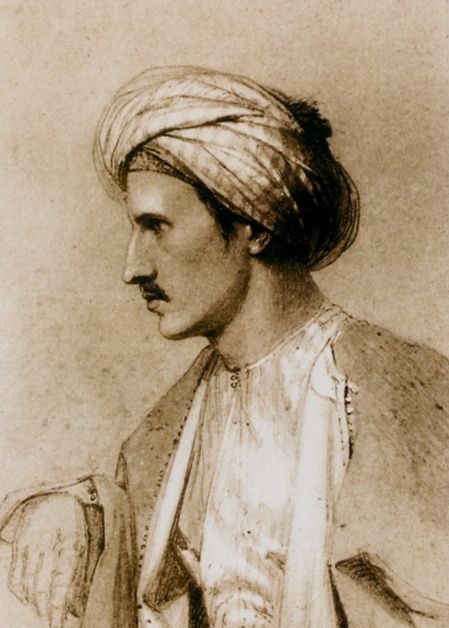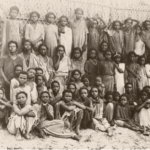
It was the questions posed by modernity that brought about the current waves of Orientalism and the Enlightenment. When the mind becomes preoccupied with questioning, it develops and discovers new facts every day. This accounts for the huge difference between the modern, Enlightenment mind and the mind of the priest and the shaykh.
BY SAMEH ASKER
THIS DIFFERENCE THAT stretches the length of the Milky Way is something that can be perceived by the most sophisticated, but the shaykh can only view it with his primitive mentality that may not yet have got to the evolutionary stage of mankind before his discovery of fire. This is why some of our shaykhs – may God cherish them – come across like aliens from planets thousands of years behind the Earth and still living in an age of swords, donkeys and animal deposits.
In his encyclopaedic The Dawn of Conscience James Henry Breasted assumed that the age of human savagery lasted millions of years, while the era of his conscience began with his understanding and recording of history – a period no longer than five thousand years. So we are actually living in an era which is the dawn of conscience for humanity, one which will inevitably evolve into a greater, more sincere and moral conscience. It may be that 1,000 years from now humanity will have evolved exclusively into vegetarians and will have abandoned the slaughter and eating of animals. Their conscience will then prevent them from reconciling with all earlier aspects of savagery, much like the way we currently reject the slavery of the Middle Ages with all it implied and produced, and which the people of those times saw as something moral, or least not contradicting the spirit of faith, morality or logic.
What distinguished the Orientalists was the way they approached the study of Islam and Arab culture from outside the box
The phenomenon of Orientalism is a 19th century scientific phenomenon that accompanied modernity and scientific and industrial development, and appeared first in a German society marked by its enthusiasm for knowing all the peoples of the East. These Germans travelled to the Middle East, the Near East and the Far East, and while some of them were prejudiced against Islam, unlike those mentioned by al-Nadawī in his book Al-Nabī al-Khātim, there were those who demonstrated fairness in their attitude to Islamic civilization, such as the writer Sigrid Hunke in her books Allahs Sonne über dem Abendland” (‘Allah’s sun over the West’) and Kamele auf dem Kaisermantel. Deutsch-arabische Begegnungen seit Karl dem Großen (‘Camels on the imperial mantle. German-Arab encounters since Charlemagne’) and Allah ist ganz anders, Enthüllung von 1001 Vorurteilen über die Araber (‘Allah is very different, Unveiling of 1001 prejudices about the Arabs’).
It is clear that this writer was passionate about communicating with the East, and this was the original motivation in Orientalism: a passion for knowing Eastern cultures. Much like Sigrid Hunke there also emerged many who did justice to Islamic civilization, such as the Frenchmen Gustave Le Bon, John Labeaume, and André Miquel and others, in addition to Montgomery Watt, Will Durant and Joseph Van Ess, and many more.
What distinguished the Orientalists was the way they approached the study of Islam and Arab culture from outside the box. They were therefore free of the ailments of tradition, dependency and rigidity and their writings were thus all the more vital, lustrous and profound. This aspect formed one of the pillars of Orientalism in general.
The global orientalist movement was based on two things: Firstly – the freedom they enjoyed in the secular democratic state, which allowed them to talk more liberally without fear or restriction; Secondly – the accuracy and depth in which they practiced philosophy and skepticism in an age of Enlightenment. This element – freedom and depth – is the prevailing feature of Orientalism and the conditions that fostered it were simply absent from the Muslim community in the 19th and 20th centuries. These last therefore looked on the behaviour of these Orientalists with apprehension and suspicion. They did not take into account the circumstances, the historical emergence and the composition of this scientific phenomenon, something which could be described as a human phenomenon whereby individuals overcame the obstacles of religion, geography and politics so that knowledge and truth became the primary goal.

Suggested Reading
Orientalism as an epistemological necessity for enlightenment – 3
Orientalism, moreover, did not limit itself to criticism or to challenging religious thought or faith in general; this is an epistemological phenomenon, only part of which was limited to attempts at identifying the customs and cultures of the Middle Easterners. Such was the work of the English Orientalist Edward Lane who wrote his work An Account of the Manners and Customs of the Modern Egyptians (‘written during the years 1833-1835’). He travelled in Egypt during the 19th century and wrote down his observations over a period of years at the end of the era of Muḥammad ‘Alī Pasha. He was one of those who witnessed the existence of the phenomenon of white slaves in Egypt, and this was known at the time that slavery was not limited to blacks. Slave traders used to go to the Caucasus, Central Asia, the Balkans and Greece to enslave or purchase white slaves from the inhabitants of those areas.
Reading the writings of Edward Lane, one notices that white slavery disappeared from Egypt and the Middle East in favour of black slavery shortly after this period. That is, following the Russian wars against both the Persians and the Ottomans. In these wars the Russians were always the victors, and they gained land at the same time as revolutions in the Balkans and Greece were taking place against the Ottoman occupiers. Note that Russia fought a total of six wars against the Persians and the Ottomans during the 18th and 19th centuries, winning all of them and gaining territories from the two countries, and acquiring many peoples who place themselves under the authority of the Tsar. History testifies that the Ottoman and Persian states were permanent sources of slaves from both white and black peoples, and that when Russia prevailed in its battles against the two countries it deprived the Ottomans and Persians of their white slaves from Armenia, Azerbaijan, the Circassian and Turkmen, regions, from Bulgaria and Crimea and elsewhere.
Main Image: Edward William Lane (1801-1876), author of An Account of the Manners and Customs of the Modern Egyptians and of the monumental Arabic-English Lexicon, to which he devoted 35 years of his life.
Read Part One of this essay here
